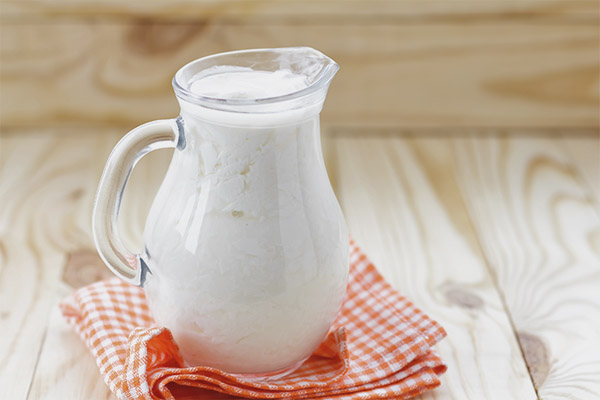The content of the article
Making up your diet, pregnant women are actively analyzing the beneficial properties of certain products. It is no secret that dairy and fermented milk drinks are very useful for digestion and are a valuable source of calcium. A fresh kefir, for example, has a characteristic sourness that meets the taste needs of many mothers.
Despite the nutritional value of the drink and safety, it is necessary to know how and in what dosage to use kefir. If you abuse or are allergic to lactose, you may develop intolerance to the drink and digestive disorders, which adversely affect the condition of the pregnant woman and the child.
Chemical composition and species
A delicious fermented milk drink was invented by chance - a special fungus was introduced into the milk, which was later called “kefir”.From then until the 19th century, the recipe for the miraculous drink was kept secret and inherited. Now every future mother can appreciate the benefit of the drink and even explore its amazing composition:
- vitamins of all groups (A, PP, H, E, D, C, B and others);
- lactic acid bacteria (lactobacilli);
- fats (saturated and unsaturated);
- minerals (iron, calcium, manganese, phosphorus, potassium, copper, zinc, sodium, and others);
- starch;
- proteins;
- sugars (glucose, lactose, maltose, fructose, and others);
- alimentary fiber;
- ethanol;
- caffeine;
- theobromine;
- phytosterols (campesterol, beta sitosterol, stigmasterol and others).
The ratio of many components (proteins, calcium, fats, carbohydrates, etc.) varies, which allows producing several types of kefir for all occasions:
- low fat (0-1% fat);
- fat (more than 3%);
- classic (average fat content - 2.5%);
- cream (kefir high fat content of 6%).
Creamy and fatty kefir is mainly used in cooking for baking, sauces, gravy and other dishes. Pregnant women should pay attention to the classic, and better fat-free version, which is ideal for drinking, is quickly absorbed and is well tolerated by the body.
Some manufacturers add flavors and fruit flavors (often of synthetic origin) to kefir. Nutritionists advise expectant mothers not to get involved in such innovations. If the usual kefir is “hard”, then it can be diluted with natural homemade jam or jam, whipped in a blender with fruit.
Kefir during pregnancy - maximum benefit
Sour milk drink is most appreciated for the content of amino acids. At the same time kefir is one of the champions in the content of these useful components, some of which are not synthesized in our body and come exclusively from food (indispensable). Amino acids are responsible for the most important processes in the body:
- Strengthen the immune system, prevent the penetration of pathogenic microflora into the body.
- Slow down the aging process.
- Participate in the production of building material for ligaments, muscles, bones, tendons of the baby.
- They affect brain activity, improve memory and concentration, reduce the risk of nervosa and depression, anxiety in future mothers.
- Raise mood, regulate its differences.
- Promote healing and tissue regeneration, facilitate recovery after childbirth.
- Control weight gain.
- They participate in the synthesis of growth hormones important for the formation and development of the child.
- They reduce the level of cholesterol, which is normally present in kefir and enters the body.
- Interfere with oxidative processes.
- Protect the kidneys and liver of the future mother from increased stress as the uterus grows.
- Regulate pressure, preventing hypertensive states (hypertension, eclampsia), arrhythmias.
What else is useful for the future mother kefir:

- Valuable source of calcium. It is known that fermented milk drink is absorbed 30% faster than milk. Due to this, the building material for the bone and muscular system is delivered faster "to destination". In addition, a shock dose of calcium produces fracture prevention in the expectant mother, the birth trauma of the child. Kefir is also needed to protect the enamel of a pregnant woman from destruction, which often happens when carrying a baby.
- Contains lactose. Milk sugar is very important for the body, as it prevents the development of many microbes and bacteria, and also provides a more complete absorption of calcium.
- Normalizes digestion. Kefir is widely distributed in the people because of its ability to stimulate peristalsis. It reduces toxemia and nausea in the expectant mother, increases her appetite, improves the motility of the stomach and intestines, reduces heartburn and bloating. Subsequently, the drink produces a mild laxative effect and at the same time the prevention of chronic constipation, hemorrhoids, which often disturb pregnant women.
- Interferes with dysbacteriosis. Lactobacilli colonize the body of the future mother and prevent the reproduction of other pathogenic bacteria and fungi (including yeast, which provoke thrush).
- Provides the body with energy. Moderately high-calorie kefir quickly satisfies hunger with just 1 cup. Due to the content of natural sugars and milk fat, the body receives a loading dose of energy without consequences in the form of extra pounds.
- Promotes the absorption of nutrients. The qualitative composition of kefir is ideal for both water and fat soluble components. Kefir helps to digest such trace elements as iron, ascorbic acid, calcium, magnesium and vitamin D.
- Cleans the body. Plant fiber and unsaturated fats clean the body from toxins, radionuclides, poisons, metabolites and "bad" cholesterol.
- Prevents anemia. Kefir contains enough iron and B vitamins. Against the background of the deficiency of these components, pregnant women often develop anemia.
How to apply
First of all, you need to drink only fresh drink (shelf life of not more than 7 days when closed). Recently, kefir with a long shelf life (about a month), which contains thickeners and preservatives, has been coming to the shelves.
Nutritionists allow pregnant women to drink fermented milk drinks daily, but in a volume of not more than 600 ml (the mass of all milk products per day).
Do not eat kefir immediately from the refrigerator - close and catch a cold. It is advisable to warm to room temperature and drink in slow sips.
Gastroenterologists recommend eating kefir shortly before bedtime. During the night, the product will digest and stimulate intestinal motility, so in the morning the expectant mother will have a good appetite and digestion will be restored. But to combat chronic constipation or dysbiosis, lactic acid drink is recommended to drink in the morning on an empty stomach to start the work of the digestive tract.
Is kefir harmful to pregnant women?
Despite the great benefits and high digestibility, there are strict contraindications to the use of kefir:
- lactose allergy;
- diseases of the digestive tract organs (ulcers, gastritis, colitis, increased acidity, etc.);
- the need to comply with therapeutic diets;
- acute food or alcohol poisoning;
- severe kidney disease;
- chronic diarrhea.
It is also necessary to take into account that kefir is obtained as a result of fermentation, therefore it may contain a small dose of alcohol. Some doctors are trying to prove the negative impact of kefir alcohols on the embryo, however, adequate studies have not been conducted. According to various sources, the drink contains only 0.6% ethyl alcohol - as much as in a non-alcoholic beer. But you should know that every day the storage of the product increases the fermentation, as a result of which the figure may slightly increase.
Obviously, kefir does not have a harmful effect on a healthy body. But a high proportion of beneficial bacteria, fiber and proteins support the body of the expectant mother during pregnancy and after childbirth. Low-calorie drink can be safely applied at different times, because it does not contribute to weight gain, but also cleans the body of toxins.
Video: 10 facts about kefir that you did not know












To send